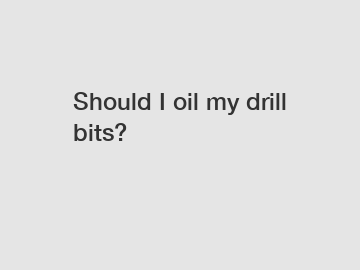Should I oil my drill bits?
Drilling holes is a common task in both professional and DIY projects. While the effectiveness of a drill largely depends on the quality of its bits, many people wonder whether they should oil their drill bits for better performance and longevity. In this article, we will delve into this question, examining the benefits and drawbacks of oiling drill bits, and provide you with insights to help you make an informed decision.
1. Understanding the Purpose of Oiling Drill Bits:
Drill bits are susceptible to wear and tear due to the intense friction generated during drilling. Oiling drill bits is commonly done to reduce friction and heat generated, prolonging their life span. The oil acts as a lubricant, enhancing the smoothness and efficiency of the drilling process.

2. The Pros of Oiling Drill Bits:
a) Minimizing Heat Build-Up: Friction generates heat, which can lead to the dulling of drill bits. Applying oil to the bits lowers the heat produced, thereby reducing the risk of overheating and prolonging their sharpness.
b) Preventing Rust and Corrosion: Drill bits are typically made of steel, making them susceptible to rust and corrosion. Oiling the bits creates a protective barrier, preventing moisture from seeping into the metal, and therefore, reducing the likelihood of rust formation.
c) Enhancing Drill Bit Performance: Properly lubricated drill bits tend to drill more smoothly and efficiently. The reduced friction allows the drill to work with less effort, resulting in a cleaner and faster drilling process.
3. The Cons of Oiling Drill Bits:
a) Contamination: Oiling drill bits carries the risk of contaminating the material being drilled. If you plan to work on wood, for instance, the oil may leave behind undesirable stains or affect the paint or finish. Similarly, oiling bits used for metal drilling may cause issues if the metal requires a particular finish or is intended for welding.
b) Reduced Grip: Applying oil to drill bits may reduce the grip between the bits and the chuck. This can potentially lead to the bit slipping or spinning within the chuck, resulting in improper drilling and potential accidents. It is essential to maintain a firm grip on the drill and ensure proper chuck tightness when using oiled drill bits.
4. Factors to Consider:
a) Drill Bit Material: Different drill bit materials may have different requirements when it comes to oiling. High-speed steel (HSS) drill bits generally benefit from oiling due to their susceptibility to heat damage. However, carbide-tipped bits may not require oiling as carbide is more resistant to heat.
b) Work Environment: The projects you undertake and the places you work in should be considered. For outdoor projects or humid environments, where the risk of rust is higher, oiling your drill bits becomes more critical.
In conclusion, the decision of whether to oil your drill bits depends on various factors. If the material and the environment call for it, oiling can significantly enhance drill bit performance, prevent rust, and increase their lifespan. However, potential contamination and reduced grip should also be taken into account. Ultimately, the choice lies with the user. If you decide to oil your drill bits, remember to choose an appropriate oil and clean the bits thoroughly after use to remove any leftover residue. With proper care, your drill bits can serve you well for years to come.
For more information, please visit hybrid drill bit manufacturer, china hdd pdc bit manufacturer, Pdc Drill Bit.

Comments
0